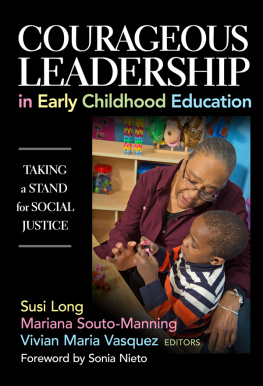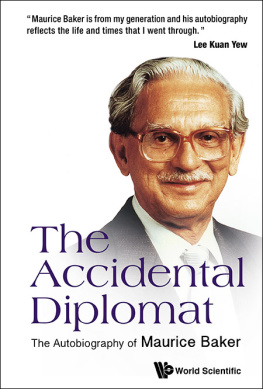

Published by Redleaf Press
10 Yorkton Court
St. Paul, MN 55117
www.redleafpress.org
2014 by Maurice Sykes
All rights reserved. Unless otherwise noted on a specific page, no portion of this publication may be reproduced or transmitted in any form or by any means, electronic or mechanical, including photocopying, recording, or capturing on any information storage and retrieval system, without permission in writing from the publisher, except by a reviewer, who may quote brief passages in a critical article or review to be printed in a magazine or newspaper, or electronically transmitted on radio, television, or the Internet.
First edition 2014
Cover design by Jim Handrigan
Interior design by Ryan Scheife, Mayfly Design
Typeset in Sabon and Trade Gothic
Library of Congress Cataloging-in-Publication Data
Sykes, Maurice.
Doing the right thing for children : eight qualities of leadership / Maurice Sykes ; foreword by Thomas Schultz.
pages cm
Includes index.
Summary: This book provides a clear framework and a systematic approach to help early childhood professionals become more capable, competent, and effective leaders as they serve young children. It presents eight core leadership valueshuman potential, knowledge, social justice, competence, fun and enjoyment, personal renewal, perseverance, and courageand shares stories to inspire and challenge readers as they guide the teachers and directors they work with Provided by publisher.
ISBN 978-1-60554-390-1 (e-book)
1. Early childhood educationUnited StatesAdministration. 2. Educational leadershipUnited States. 3. Early childhood teachersTraining ofUnited States. 4. Early childhood educatorsUnited States. I. Title.
LB2822.6.S95 2014
372.210973dc23
2014009007
To my mother and father, Eloise Browning Sykes and Joseph C. Sykes, who helped to shape and form my core values by teaching me one simple rule: do unto others as you would have them do unto you, but do unto your siblings first
So, to my sibs: Joyce Katherine, Greta Louise,
Joseph C. (aka Butch/Yusuf),
Lawrence Raymond, and Bruce Anthony
Many things we need can wait. The child cannot.
Now is the time his bones are formed, his mind developed.
To him we cannot say tomorrow, his name is today.
Gabriela Mistral
CONTENTS


Growing up, my standard breakfast was cereal with milk, and Wheaties was prominent in the rotation of options. Its slogan, Breakfast of Champions, went hand-in-hand with the then-popular adage that Champions are made, not born. I think most of us dream about becoming champions and, even when those dreams dont come to pass, we still love to cheer for heroes and we yearn to follow inspirational leaders. Books and films about champions in sports, politics, business, and social change are best sellers, because we want to know what makes these men and women tick, what sets them apart, and what secret strategies or special capabilities undergird their success.
Those of us who make our careers in early childhood education cherish our leaders too, whether they set the pace for us as advocates such as Helen Blank and Marcie Whitebook; policy leaders such as Joan Lombardi, Harriet Dichter, and the late Helen Taylor; or researchers such as Robert Pianta, Barbara Bowman, and Sharon Lynn Kagan. Were curious about them too. As we implement policies they develop, attend their keynote speeches, or read their writings, we wonder about how they became so productive and influential. How did they navigate their pathway to leadership? What would we learn if they invited us to watch them negotiate behind closed doors with legislators, governors, congressional staff, or cabinet secretaries? How they would advise us if we could persuade one of them to become our mentor or leadership coach? What if we could spend a day talking with them about their lessons learned from decades of leadership at the highest level?
The book you are about to read, Doing the Right Thing for Children: Eight Qualities of Leadership, answers these questions from the perspective of one of my all-time, top-10, favorite early childhood leaders, Maurice Sykes. I first met Maurice in the early 1990s when he served as director of early childhood for the District of Columbia Public School System, leading a system-wide effort to improve teaching and learning opportunities for more than 34,000 preschool-to-third-grade children.
Urban school districts are not the most congenial environments in which to create developmentally appropriate and intellectually engaging classrooms for young children: Superintendents come and go. There is unrelenting pressure to improve standardized test scores. And veteran teachers are skeptical if not cynical about the never-ending cascade of innovations and reforms. Making a difference demands a wide range of talents and abilities. You need to garner and shrewdly deploy money, get parents on your side, recruit credible and effective trainers and coaches, and manage your boss so that you can promote your vision amidst a cacophony of competing initiatives from the federal government, foundations, and private sector partnersall of whom are here to help. Most of all, you need to persuade thousands of teachers and more than one hundred principals to buy into new approaches to engaging children in learning and building productive relationships with each otherwhen you dont have authority over personnel decisions or evaluation procedures.
Maurice met and overcame these challenges by designing and managing a host of initiatives around a common agenda for improving classrooms and teaching, including:

 An annual Early Childhood Leadership Institute for preschool, Head Start, kindergarten, and primary grade teachers and teacher aides
An annual Early Childhood Leadership Institute for preschool, Head Start, kindergarten, and primary grade teachers and teacher aides

 Early childhood demonstration centers for teachers and administrators to visit and observe
Early childhood demonstration centers for teachers and administrators to visit and observe

 Ongoing professional development through a cadre of collegial consulting teachers
Ongoing professional development through a cadre of collegial consulting teachers

 Seminars for principals and teacher-led study groups on education reform issues
Seminars for principals and teacher-led study groups on education reform issues
Next page












